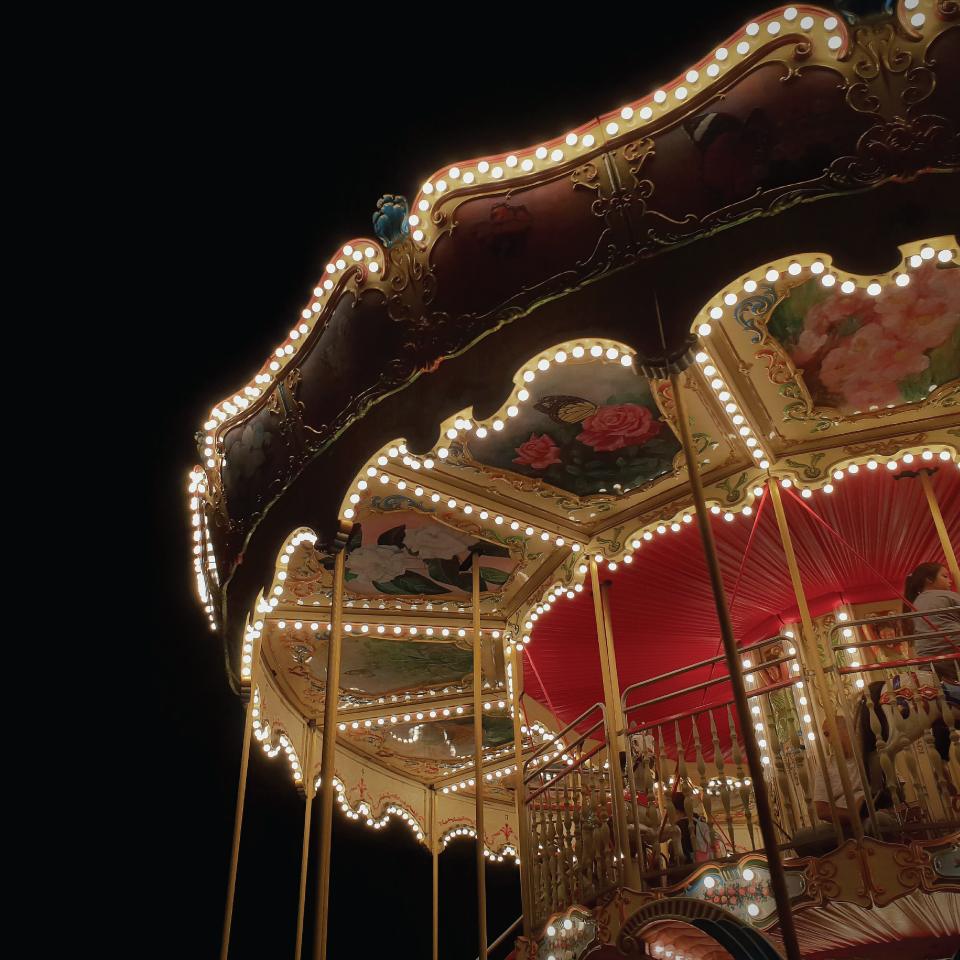Toward the end of the 1989 film Parenthood, a cheerful grandmother, dismissed throughout the movie as being a bit ditzy, tells her harried children:
“You know, when I was nineteen, Grandpa took me on a roller coaster. Up, down, up, down. Oh, what a ride! I always wanted to go again. You know, it was just so interesting to me that a ride could make me so frightened, so scared, so sick, so excited, and so thrilled all together! Some didn’t like it. They went on the merry-go-round. That just goes around. Nothing. I like the roller coaster. You get more out of it.”
In the practice of my faith, pondering that scene has sometimes brought me a measure of reassurance, and some spiritual relief, too, because even with all the devotions and feast days I love—all the ways the Church infuses my day-to-day with instruction and anticipation (June is the month of the Sacred Heart, October the month of the Rosary, and a month chock full of favorite saints! It’s all so much fun!)—I too often find myself struggling for interior balance.
If I feel good about going to confession and being (however briefly) in a state of grace, I feel lousy when I wound charity by barking thoughtlessly, needlessly, at family members who simply want a bit of my attention. Unable to regain my equilibrium with sincerely rendered apologies and a resolve to “do better next time,” I instead have an unusual need to beat myself up and let my small impatience set a miserable tone for the whole day. On other occasions, I permit myself excesses, as with small treats, with a blithe recklessness, even though, deep down, I knew I should not.
This sounds like nothing, I know. Common stuff! A few snippy turns at selfishness; a few indulgences. But both my inability to accept forgiveness (and to forgive myself) on the one hand, and my unwillingness to be called out on bad practices (or to discipline myself) on the other, can give me a kind of spiritual whiplash born of pride. I become impatient because I have work to do—more “important” than a family member’s actual, worthy needs; I make a big deal of feeling bad about it because, golly! I’m a Benedictine and should be “better” than that! I indulge the sweet tooth because, well, don’t tell me what to do; and, anyway, if God wanted me to resist it, his grace would be enough! The fat is my thorn in the flesh by God’s own design!
The hubris is almost palpable, and it all becomes a real-time experience of vice and of distorted focus that misses the center of all things, which is Christ.
Here I am—a woman swinging between excesses and defects of pride with pit stops at vanity, gluttony, and sloth. Here I am—someone excessive over “work” gifts and defective in appreciation of familial ones. Here I am—a person deciding that while God and family may offer forgiveness, I know better and must deny it to myself.
Here is the pride of someone so caught up in flesh and matter, so dizzy from extreme swoops and swerves into viciousness and then piety, that she presumes to know the mind of God and the measure of his grace. Oh, pray for this lady; she’s a handful!
When I express self-loathing over my selfishness and my propensity for “missing the mark,” someone will usually rush to let me off the hook, and they’ll usually say one of two things. The first and most immediate response is often, “That’s just your Catholic guilt talking,” a get-out-of-jail free card that I tend to resist because, folks . . . it’s just too easy.
I think “Catholic guilt” is an overplayed, cheap joke that people use to denigrate the notion of sin. As with any cliché, there is an element of truth to it—there have certainly been instances where Catholics have been so imbued with a sense of shame that it could distort perspectives about what is human and difficult—but it’s a small element and one that really isn’t relevant anymore; I’m doubtful that recent generations coming through CCD and religious education or Catholic schools in the past thirty years can claim to be its victims. The continuing narrative of “Catholic guilt” is just an intellectually lazy broadside against the idea of sin-as-reality.
What is represented as “Catholic guilt” today is simply a well-formed conscience awake to the things that endanger our souls, make the world a harder place, and dilute our relationship with God. Are some things really and truly sinful? Yes! Let’s be able to say that, and let’s be able to identify them beyond our ideologies, which often lead us astray.
If I am not offered the “Catholic guilt” escape route, the other thing I will hear from people when I discuss my failings is, “Admitting all this is a grace from God.”
I know that, of course, and I also know that God’s assistance in doing better is mine for the asking, although his methods may also, sometimes, leave me reeling. Which is maybe why I don’t always ask.
But if I am having ups and downs, if my metaphorical stomach is a bit queasy, I am grateful for it. It means I am at least on the roller coaster, and not on the carousel. Instead of simply going round and round unto stultifying stagnation, I am in the spiritual thick of things, now resisting; now tumbling forward; now climbing and striving against all sense; now being thrown for a loop; now screaming and letting go of the bars, in faith; now clinging to them again as the next turn approaches.
Living within a formed Catholic conscience is not for wimps. But the wild ride is worth it.
Adapted from a piece previously published in 2011.
